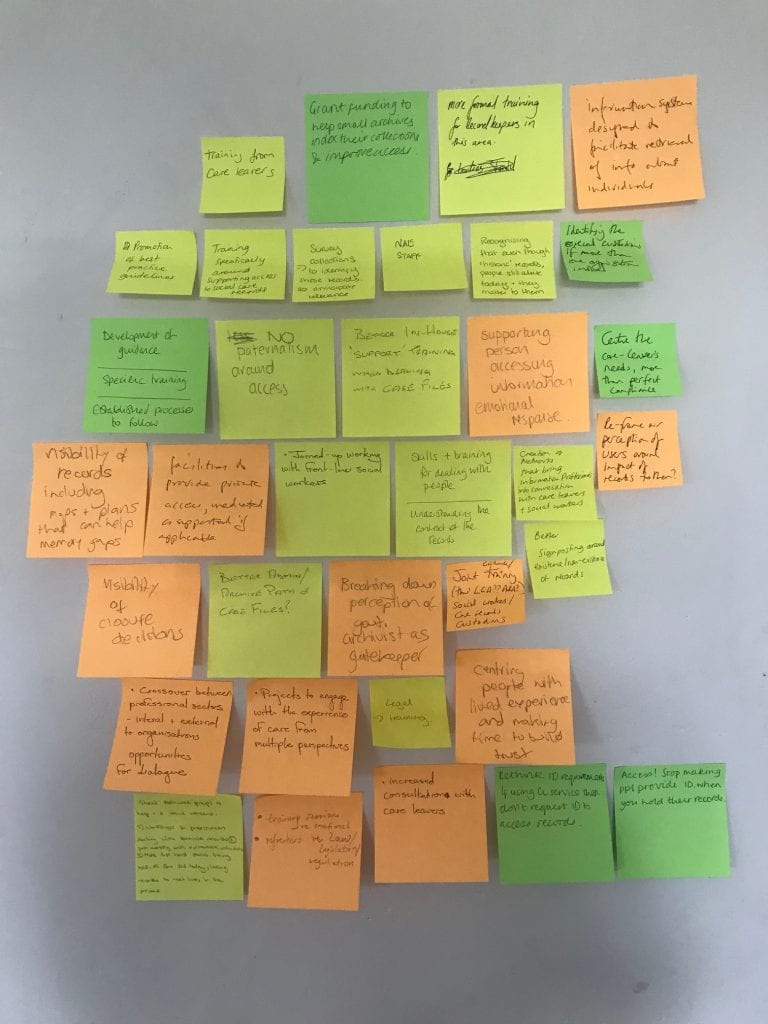Speaking at the Archives and Records Association Conference
By Victoria Hoyle, on 10 September 2018

On the 30th August Darren, Gina, Andrew and I (Victoria) attended the annual Archives and Records Association conference in Glasgow to talk about MIRRA and about the value of social care records for memory and identity. The 30 minute session was attended by over 30 archivists, records managers and conservators from the UK, Australia and the USA. We chose not to do a traditional conference paper but instead combined personal testimonies with interactive exercises to get people thinking and talking about the issues. We wanted our audience to think about two key questions:
- How and why are records like care records valuable for memory and identity?
- How can we improve the way archivists and records managers look after and provide access to them for these purposes?
We left these questions purposefully open because although some people in the room worked with care records others didn’t. While we were talking specifically about care leavers’ experiences we wanted to show how the same lessons could be applied to working with any personal sensitive information, such as health or education records.
After a brief introduction to the project we asked the audience to take part in a quick-fire exercise to get them thinking about what it means to rely on organisational records to tell your life story. They used pink post-it notes to note down records from childhood that they or their family members had, and yellow post-it notes to write down records about them held by organisations. We then asked them to imagine reconstructing a narrative of events only from the yellow post-it notes as many care leavers must do.

Darren and Gina then spoke about their personal experiences of accessing care files and the positive and negative impacts that it had on them. Both touched on some of the structural and practical difficulties of the access process, including navigating bureaucracy and redaction, as well as the emotional and personal challenges. Darren talked about his work with The Care Leavers’ Association supporting other care leavers to access their records, including people currently in prison. Afterwards many people said how important and powerful it had been to hear directly from care leavers and to see about how recordkeeping decisions had affected their lives. It put everyday processes and procedures into a new perspective.
This helped to feed into the next exercises where we asked the audience to:
1) Share what they saw to be the challenges to providing access to personal records
2) Suggest changes that could be made to improve services to care leavers and others.
Many familiar themes emerged during the discussion: the limits of Data Protection legislation, making decisions about redacting third party information, finding and identifying the right records, lack of training in how best to support the process and the emotional impact on the archivist and records manager. It was heartening to see the number of changes people thought could be made though, from the ambitious (changing the legislation) to the actionable (development of training). The key message that emerged was the importance of putting the care leaver first in the process – a response that seemed directly connected to having heard the personal stories earlier in the session. Almost half of the attendees said that they would change something in their work as a result of being at the workshop, which is a great result.

Afterwards Darren, Gina and I met up with Nicola Laurent and Michaela Hart from Australia to talk about the work they have done there with the Find and Connect web resource. It was an opportunity to share the learning that they’ve done over the last ten years in supporting care leavers, former child migrants and the Stolen Generations of aboriginal children to find and access their records. We hope that in the long term we can move towards a similar level of recognition and investment in supporting care leavers’ memory and identity.
3 Responses to “Speaking at the Archives and Records Association Conference”
- 1
- 3
 Close
Close



Easier and/or facilitating access for care leaver’s to access their records can result in frustration to the care leaver who might find on access that there is, in fact, no real access – because records are deplete of record and/or have been heavily redacted.